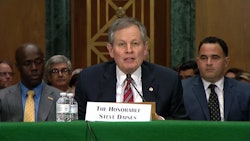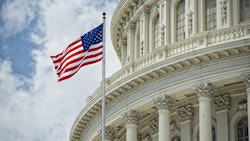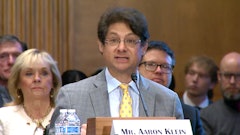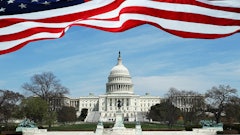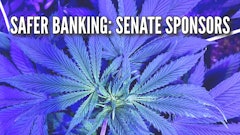
Editor's Note: This article was updated Sept. 22 for clarity and to add that Senate Banking Committee updated its calendar, posting a specific time for the scheduled markup.
As the SAFE Banking Act takes a historic first step to move through the Senate, with a markup scheduled by the Senate Banking Committee for Sept. 27, on Sept. 19—the same day the committee formally announced the scheduled markup—a revised version of the act was revealed; the amended bill includes a new title, the Secure and Fair Enforcement Regulation (SAFER) Banking Act of 2023 (S. 1323)—with the addition of the word “regulation”—as first reported by Politico. (UPDATE: Since that confirmation on the date, the Senate Banking Committee has calendared an executive session to consider a revised version of the legislation at 9:30 a.m. Sept. 27.)
As Cannabis Business Times reported Sept. 20, “Predominantly, the nuts and bolts [of the bill] remain intact: to provide safe harbor for banks, credit unions, other financial institutions and payment processors that provide services to state-licensed cannabis businesses, allowing them to operate in the financial mainstream despite the conflict between federal and state laws pertaining to cannabis as a controlled substance.”
However, the revised bill includes eight additional pages of text that are “almost entirely related to the much-debated Section 10 of the legislation, which largely addresses requirements for federal banking agencies to oversee financial institutions so that their services are only provided to good actors, whether that be in the cannabis industry or elsewhere,” CBT reported.
The amended bill also includes language to foster greater access to financial services for disadvantaged communities and business start-ups. A new subsection to Section 10 titled “Increasing Access to Deposit Accounts for Businesses and Consumers” would require “regulators and banks to work with the U.S. secretaries of commerce and treasury (within two years of enactment) to ensure depository institutions serve rural areas and low- and moderate-income communities, as well as tribal communities. This subsection was not specific to cannabis businesses only,” CBT reported.
Less than a week ahead of the scheduled markup—the first time any version of the SAFE Banking Act has made headway in the upper chamber, despite passing seven times in the House—CBT takes a deep dive into important questions around the revised text, what is expected to happen during the scheduled markup, and what happens next for the SAFER Banking Act if the bill heads to the full Senate for a vote.
To get answers to these and other questions, CBT spoke with Jonathan Havens, partner and co-chair of Saul Ewing’s Cannabis Law and Food, Beverage, and Agribusiness practices, whose background includes working as a legislative aide in the House and Senate, before beginning his legal career as a counsel at the U.S. Food and Drug Administration (FDA).
Here is what he had to say.
Noelle Skodzinski: Would you shed some light on what happens during a markup and what you expect to happen during the Sept. 27 markup of the SAFER Banking Act?
Jonathan Havens: Another way to think of a markup is essentially a committee of jurisdiction—[which] has oversight over the issues being considered in the bill—considering the legislation and specifically considering amendments to the measure.
So, we've heard about SAFE, now we're hearing about SAFER. The committee chair has the prerogative to decide, which, if any, the committee will consider. And although there could be amendments, a lot of negotiating has happened outside of a formal markup, so it’s not a certainty that members will introduce them.
I think we'll have a better idea of that over the coming days.
NS: Do markups typically finish in one meeting or might this continue on?
JH: I would expect that it's going to get done in one session.
I'm not going to suggest that markups have never extended over multiple days, but I think the committee will likely and hopefully have enough time to get its business done in one day.
And I should say, by the way, that I talked about the amendment process. But the whole purpose of what we're talking about here and frankly what our clients and the markets are paying attention to is: Does the committee report the piece of legislation out, does it get out of committee and finally get to the Senate floor?
I know it's gotten to the House floor a number of times. But it's never reached the full Senate for consideration. … The bottom line, though, is people seem to be more cautiously optimistic this time around that it will in fact reach the Senate floor.
But the committee markup is significant because that determines in what state the piece of legislation reaches the Senate floor. And so, we're going to be paying close attention to what amendments, if any, are offered and considered and ultimately potentially adopted at the committee level.
NS: What are the potential outcomes that could follow the markup meeting?
JH: One would be that a majority of its members approve it advancing to the Senate floor.
NS: Are there any other potential outcomes? Might it be sent to another committee?
JH: When a piece of legislation is introduced in the Senate—by one or multiple senators in the Senate, or one or more members of Congress in the House—it is referred to a committee or committees of jurisdiction. In this case, the Banking Committee is the natural fit because we're talking about banking, but sometimes it can be referred to multiple committees if there's overlapping jurisdiction.
My sense is that jurisdictional assignment would have already happened. Sometimes during a markup, I suppose it's possible that you could get a committee to say, “Well, we really need another committee to weigh in here.” Frankly, because these committees can be somewhat territorial and don't want to cede jurisdiction to anybody else or don't want another committee's fingerprints necessarily on a piece of legislation that they think is more within their bailiwick, I wouldn't expect that that's one of the outcomes we're talking about here.
I think really what we're paying attention to is what, if any, amendments are offered and what, if any, are successful and what the vote is of the committee to decide on reporting this out to the full Senate for the entire body's consideration.
It seems to me that the discussion points have been there. The committee chair is—confident is not the word I would use, but thinks the votes are there to get it out of committee and arguably to get it through the full Senate.
But … we haven't seen the legislation get to the full Senate before.
I think we're in a different spot than we have been before, though, and I would say we almost certainly are—the announcements around rescheduling of marijuana from the Biden administration last October and then more recently one part of the Biden administration, HHS [the U.S. Department of Health and Human Services] in sending its scheduling recommendation to DEA to reschedule to Schedule III.
It seems like the winds are more favorable than they have been. So I'm cautiously optimistic it gets out of committee.
NS: What do you think happens if it goes to the full Senate?
JH: I think that’s one of the questions on my mind and frankly a lot of our clients’ minds. And, for example, this Section 10 that's being talked about quite a bit.
One of the things that's being discussed is: Is there enough in Section 10 to give some members of the committee and some members of the Senate enough comfort that this is not going to open the floodgates and allow anyone and everyone that has anything to do with cannabis to access banking and financial products. I think that that's the point of Section 10, really, to appeal to members who aren't as in favor of this as other members.
So we're going to be paying close attention to how, if at all, Section 10 gets revised.
But if and when it gets to the full Senate, one of the things we are particularly focused on is whether Majority Leader Schumer offers up some kind of criminal justice amendment (e.g., expungements for certain cannabis-related offenses). I think some of these have been nonstarters for some members of the Senate previously and have prevented broader-based support—really enough votes for what was previously referred to as SAFE Banking that we're now calling SAFER. That has been one of the reasons it hasn't advanced before, that the measure with such amendments was viewed by these members as being too expansive.
In order to get anything advanced in the Senate right now, given how sharply it is divided, you need support from both the Republican caucus and the Democratic caucus. And it's not just 51 votes.
I think this has to be a central enough proposal that you're going to get support from both sides of the aisle. And anecdotally what I've heard, and this has been reported on, so this isn't just my opinion, but if you include too broad of measures vis-a-vis expungement, social equity, starting to remedy or fix all of the horrible impacts of the war on drugs, particularly on communities of color, it might not have as broad based of an appeal.
I don't want to suggest that any one member is anti these measures. I don't know anybody in their right mind that would suggest that it's not very important to ensure social equity features of any cannabis reform and fixing the ills of the war on drugs.
But I think what many are looking for is a pretty clean piece of legislation that addresses a narrower set of issues (e.g. banking) rather than starting to make this a broader cannabis reform or criminal justice reform measure. Because frankly, particularly with some of the Republican members of the Senate, the concern is, “Look, I'm wary of supporting anything cannabis related, even if it's for narrow banking purposes.” And so when you start to expand and expand, maybe they wouldn't be as apt to support it.
There are some Republicans that are deeply supportive of this and some Democrats that aren't. I don't want my comments to suggest that it's Republicans versus Democrats here; that's not at all the case. As with everything else, it's nuanced and it's complicated. However, the cleaner the bill, the more narrowly tailored it is, I think the better chances of broad-based support and success.
NS: What do you think we can expect to see from Majority Leader Chuck Schumer on that front?
JH: What we've heard from Schumer in commentary going back a long time is that he believes it's critical to include criminal justice reform in any cannabis reform measure, including banking-related policy. And that's not a part of the legislation now, but will he offer it as an amendment on the Senate floor? He suggested that he will.
And if he does, what, importantly, is the text of that amendment and is it such that you can still have broad-based support, enough to get this through the Senate?
NS: We have heard a question about whether certain amendments might be proposed in order to stop the bill from passing. Do you have any thoughts on that?
JH: That's an interesting question, although I don't know that I have much wisdom to share there. Members certainly have offered poison pill amendments in the past. I have heard people offer conspiracy theories saying that anybody that's been supported by the pharmaceutical industry would not be in favor of this because it would be a help to the cannabis industry.
Even though I grew up just outside of the D.C. beltway, and can sometimes be cynical I believe this is an important piece of legislation that will at its core protect the safety of cannabis businesses and will allow banks that frankly want to be in this space some safe harbor and some cover to do so and provide further legitimacy to the cannabis industry.
So I guess I choose to believe that poison pill amendments won't be offered, and if they are, they'll be seen for what they are and will be quickly defeated or not considered as part of the final package.
But anything's possible.
NS: New text was released Sept. 19 for what is now being called the SAFER Banking Act. New subsections were added to Section 10 to essentially ensure that depository institutions serve rural areas and low- and moderate-income communities as well as tribal communities. And then there's also a mention of providing greater access to deposit accounts for small- and medium-sized businesses. We're seeing that as not specifically cannabis-related according to the bill. How do you interpret the new text?
JH: I think there's been some discussion about Section 10 and essentially, on the one hand, regulators needing “valid reasons” for requesting or requiring termination of accounts. And then there's also discussion of: Is it making it so that it's difficult, like you're boxing out banks in this area?
So, for example, you get a state or a local credit union who is providing banking services to cannabis operators but they're not meeting the aims of increasing access to accounts in rural areas.
I think what will be interesting is to see if these are requirements, such that if a bank does not provide rural communities and low- and moderate-income communities with increased access to deposit accounts, then they're not going to be able to provide cannabis—it just starts to get into: Is it so prescriptive that it could stamp out some of the current participants in this space?
If you look above that subsection that you were talking about it talks about “federal banking agencies in consultation with applicable state and bank supervisors, secretary of commerce, secretary of treasury” to collectively promulgate rules. The process here is you have a bill, right? Let's presume it passes the Senate. Let's presume a same or similar version passes the House. The chambers work out their differences. The president signs it into law. Then there will be these agencies that are promulgating rules.
We don't know how prescriptive these rules are going to be and whether it's going to, in fact, make it harder for cannabis stakeholders to get access to financial depository services, banking services, or whether this is just an attempt to address some other issues along the way.
But the section heading is “Increasing access to deposit accounts for businesses and consumers,” so seemingly the heading of this suggests that we're increasing access, not decreasing access. … So maybe it's just saying when possible to increase opportunities in rural communities in low- and moderate- income communities where that makes sense.
A lot is not yet truly known about what that means until these agencies promulgate their rules.
NS: Bill text changes are not uncommon, obviously, and amendments get tacked on to try to tie in other causes and issues that could be related. But does it seem odd to you, considering this is very specifically a cannabis-related bill, to have non-cannabis-related issues being added to it?
JH: I think this all relates to cannabis banking. I think it's relating to the banks that offer services to cannabis-related businesses. I think the question is really: How does this Section 10, 2B relate specifically to the cannabis industry and to banks that want to provide financial services to cannabis clients?
And I'll admit it looks odd in the context of the rest of the bill.
I don't know that I have a lot of informed insight to provide there other than it just makes me keen to follow the regulatory proceedings here to see exactly how these federal agencies issue rules around this.
We're going to have to wait and see how this plays out.
NS: Is there anything I didn't ask about that you think is important?
JH: I've seen some discussions around whether this bill, as written, would allow uplisting—in other words, would it permit U.S. multistate operator companies that are Canadian public companies to list on a U.S. exchange like New York Stock Exchange, Nasdaq, etc.?
I don't think there's necessarily a direct capital markets hook in the bill, as written, for the U.S. exchanges to say, “Yep, we're open for business to U.S. plant-touching cannabis companies.” However, I think what a lot of them have been waiting for is an official signal from Washington, D.C., that cannabis is acceptable, and that if done properly and done in a compliant fashion, they are keen to get involved like others are.
So the text in and of itself might not answer the question of whether uplisting would be allowed, but I think we would be a lot farther along in that discussion if this legislation were ultimately signed into law. I think there's a lot here that could start to provide comfort to the exchanges. Ultimately, this is a question for the exchanges, but SAFER becoming law should give them and other stakeholders certainly more comfort than they have now.
Editor’s note: This interview has been edited for style, length and clarity.











